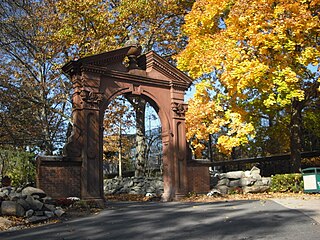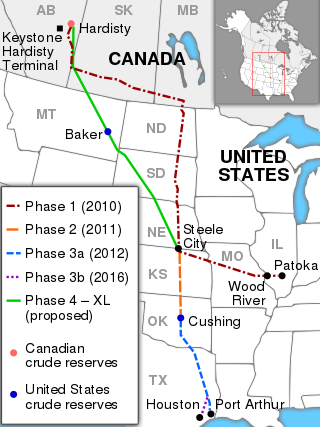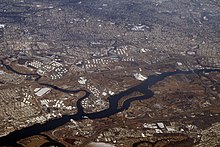
A pipeline is a system of pipes for long-distance transportation of a liquid or gas, typically to a market area for consumption. The latest data from 2014 gives a total of slightly less than 2,175,000 miles (3,500,000 km) of pipeline in 120 countries around the world. The United States had 65%, Russia had 8%, and Canada had 3%, thus 76% of all pipeline were in these three countries. The main attribute to pollution from pipelines is caused by corrosion and leakage.

Mahwah is the northernmost and largest municipality by geographic area in Bergen County, in the U.S. state of New Jersey. As of the 2020 United States census, the township's population was 25,487, a decrease of 403 (−1.6%) from the 2010 census count of 25,890, which in turn reflected an increase of 1,828 (+7.6%) from the 24,062 counted in the 2000 census. The name "Mahwah" is derived from the Lenape language word "mawewi" which means "Meeting Place" or "Place Where Paths Meet".

The Ogallala Aquifer is a shallow water table aquifer surrounded by sand, silt, clay, and gravel located beneath the Great Plains in the United States. As one of the world's largest aquifers, it underlies an area of approximately 174,000 sq mi (450,000 km2) in portions of eight states. It was named in 1898 by geologist N. H. Darton from its type locality near the town of Ogallala, Nebraska. The aquifer is part of the High Plains Aquifer System, and resides in the Ogallala Formation, which is the principal geologic unit underlying 80% of the High Plains.
The Ramapough Mountain Indians, known also as the Ramapough Lenape Nation or Ramapough Lunaape Munsee Delaware Nation or Ramapo Mountain people, are a New Jersey state-recognized tribe based in Mahwah. They have approximately 5,000 members living in and around the Ramapo Mountains of Bergen and Passaic counties in northern New Jersey and Rockland County in southern New York, about 25 miles (40 km) from New York City.

The Arthur Kill is a tidal strait in the New York–New Jersey Harbor Estuary between Staten Island, New York and Union and Middlesex counties, New Jersey. It is a major navigational channel of the Port of New York and New Jersey.

The Passaic River is a river, approximately 80 miles (130 km) long, in Northern New Jersey. The river in its upper course flows in a highly circuitous route, meandering through the swamp lowlands between the ridge hills of rural and suburban northern New Jersey, called the Great Swamp, draining much of the northern portion of the state through its tributaries.

The Ramapo River is a tributary of the Pompton River, approximately 30 mi (48 km) long, in southern New York and northern New Jersey in the United States.
The Chemical Coast is a section of Union and Middlesex counties in New Jersey located along the shores of the Arthur Kill, across from Staten Island, New York. The name is taken from the Conrail Chemical Coast Line, an important component in the ExpressRail system serving marine terminals in the Port of New York and New Jersey.

Bayway Refinery is a refining facility in the Port of New York and New Jersey, owned by Phillips 66. Located in Linden and Elizabeth, New Jersey, and bisected by Morses Creek, it is the northernmost refinery on the East Coast of the United States. The oil refinery converts crude oil into gasoline, diesel fuel, jet fuel, propane and heating oil. As of 2007, the facility processed approximately 238,000 bbl/d (37,800 m3/d) of crude oil, producing 145,000 bbl/d (23,100 m3/d) of gasoline and 110,000 bbl/d (17,000 m3/d) of distillates. Its products are delivered to East Coast customers via pipeline transport, barges, railcars and tank trucks.

Ramapo Mountain State Forest is a 4,200-acre (17 km2) state forest in Bergen and Passaic Counties in New Jersey. The park is operated and maintained by the New Jersey Division of Parks and Forestry.

Lisa Perez Jackson is an American chemical engineer who served as the administrator of the United States Environmental Protection Agency (EPA) from 2009 to 2013. She was the first African American to hold that position.

Mahwah station is a NJ Transit train station located in Mahwah, New Jersey served by the Main Line, Bergen County Line and a limited service served by Metro-North Railroad's Port Jervis Line.

The Keystone Pipeline System is an oil pipeline system in Canada and the United States, commissioned in 2010 and owned by TC Energy and, as of March 2020, the Government of Alberta. It runs from the Western Canadian Sedimentary Basin in Alberta to refineries in Illinois and Texas, and also to oil tank farms and an oil pipeline distribution center in Cushing, Oklahoma.

Ramapo College of New Jersey (RCNJ) is a public liberal arts college in Mahwah, New Jersey. It is part of New Jersey's public system of higher education. As of the fall 2021 semester, there were a total of 5,732 students enrolled at the college, including 576 graduate students and 11 doctorate students.
The Mahwah River is a tributary of the Ramapo River in Rockland County, New York and Bergen County, New Jersey in the United States.
The PennEast Pipeline is a proposed project by PennEast Pipeline Company, LLC, a consortium of five energy companies, to move natural gas from the Marcellus Shale region in Pennsylvania to New Jersey. The proposed 36-inch (910 mm) pipeline would run from Dallas, Luzerne County to Pennington, Mercer County, New Jersey, a distance of approximately 115 miles (185 km); as currently contemplated, the maximum allowable operating pressure would be approximately 1,480 psi. The pipeline requires the condemnation of properties in the state of New Jersey, which the state has opposed. A ruling against such condemnation was handed down in September 2019.

Water protectors are activists, organizers, and cultural workers focused on the defense of the world's water and water systems. The water protector name, analysis and style of activism arose from Indigenous communities in North America during the Dakota Access Pipeline protests at the Standing Rock Reservation, which began with an encampment on LaDonna Brave Bull Allard's land in April, 2016.

Morses Creek is a stream in Union County, New Jersey. It is a tributary of the Arthur Kill along with other rivers and streams, including the Elizabeth River, Rahway River, Piles Creek and Fresh Kills, and via Newark Bay, the Passaic River and the Hackensack River. Earlier names include Thompson's or Nine Mile Creek as well as Morse's Creek or Morse Creek. It is named for the family of Peter Morse, also spelled "Morss," who settled here in the 1600s and remained for 200 years; Morse family headstones may still be seen to this day.
Fossil fuel regulations are part of the energy policy in the United States and have gained major significance with the nation's strong dependence on fossil fuel-based energy. Regulatory processes are established at the federal and state level due to the immense economic, socio-political and environmental impact of fossil fuel extraction and production. Over 80% of the United States' energy comes from fossil fuels such as coal, natural gas, and oil. The Bush administration was marked by the Energy Policy Act of 2005, which provided a monetary incentive for renewable energy adoption and addressed the issue of climate change. The Obama administration was made up of advocates for renewable energy and natural gas, while Donald Trump built his campaign on promises to revive the coal industry.
The Byhalia Pipeline, also referred to as the Byhalia Connection Pipeline, was a proposed 49-mile crude oil pipeline project in Memphis, Tennessee. Proposed by two companies, Plains All American Pipeline and Valero Energy, it was canceled in July 2021 after months of activism and resistance from organizations including Memphis Community Against the Pipeline (MCAP), Protect Our Aquifer, the Memphis and Mid-South Chapter of The Climate Reality Project, and other partnered organizations. Opposition to the pipeline was based primarily around impact concerns for the Memphis drinking water aquifer below the intended pipeline location that supplies drinking water to approximately 1 million people. Plans for the Byhalia Connection pipeline project were called off after a statement from Plains All American Pipeline director of communications that the project was no longer being pursued "primarily due to lower U.S. oil production resulting from the COVID-19 pandemic".















